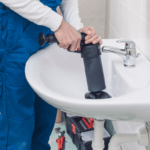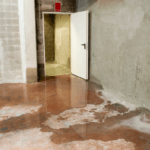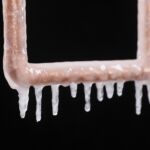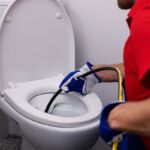Sewage backups can turn your basement into a nightmare. Raw sewage flooding into your living space brings health risks and extensive damage. Understanding what causes these backups is the first step toward prevention. This article explores the common causes of basement sewage backups and provides tips to safeguard your home.
What Causes Sewage Backups?
Several issues can lead to sewage pushing back through drains and toilets into your basement. The most frequent causes include:
Blockages
Blockages in drainage pipes are a prime culprit behind sewage backups. Debris like hair, grease, and tree roots can narrow pipes over time, eventually plugging them fully. Toilets clogged by wipes, feminine products or other items sent sewage backwards when flushed. Even minor drain clogs can cause backups if located in critical positions. Blockages force sewage to take alternative routes, often into your basement.
Line Breaks
Cracks and breaks in drainage pipes also enable sewage backups. Older pipes made from clay or steel are prone to cracking as they rust and settle. Tree roots infiltrate tiny cracks, widening them as the roots grow. Loose joints between pipes disconnect under pressure. Any breach or break in your home’s plumbing network can provide an opening for sewage to flood your basement during heavy usage.
Overloaded Sewer Lines
Municipal sewer lines get overloaded during intense rainstorms. Large volumes of stormwater and wastewater fill sewer pipes past capacity. The overloaded system pressurizes, pushing sewage backwards into basements through drains and toilets.
Sump Pump Failures
Sump pumps remove groundwater from around your foundation, preventing flooding. But when sump pumps fail due to power outages or mechanical issues, water accumulates and saturates the soil. Liquids follow the path of least resistance – if your floor drain lacks a backflow valve, sewage can flow backwards from overloaded sewers into your basement.
Improper Drainage
Incorrect drainage grading around your home’s foundation funnels groundwater toward your basement walls instead of away from your house. This amplifies wetness against the foundation. Improper drainage, combined with sump pump problems, drastically raises your sewage backup risk whenever the sewer system overflows.
Septic System Issues
Homes on septic systems also face sewage backup risk. When septic tanks are overfull or drainage fields become saturated, sewage can back up through drains into the basement. Insufficient tank pumping and poor septic maintenance heighten your vulnerability.
How to Prevent Sewage Backups
While you can’t eliminate the risk, proactive maintenance significantly reduces the likelihood of basement sewage backups. Key prevention strategies include:
Regular Drain Inspections
Inspect sinks, showers, and floor drains regularly for proper drainage. Pour water into rarely used drains monthly to keep water in the traps. Watch for slow drainage, gurgling noises, or foul smells—signs of possible blockages. Inspect pipes for damage and leaks. Catching issues early better prevents backups.
Drain Maintenance
Routinely clean drains and pipes to remove built-up gunk. Use a drain snake monthly to clear debris and keep water flowing freely. Consider professional hydro jetting services annually to scour interior pipe walls. Proactive maintenance removes blockage risks before they escalate into backups.
Clog-Free Plumbing Habits
Never pour fats, oils or grease down sinks – these coat pipes and attract other debris. Install sink strainers to catch food particles. Throw wipe products and feminine items in the trash, not the toilet. Avoid using harsh drain cleaners or caustic products, which can damage pipes. Making minor plumbing habit adjustments reduces potential clogs.
Rooter Services
Tree roots often infiltrate and break pipes, seeking water sources. If trees grow near your home, consider professional rooter services. Root cutting, foaming, or barriers can protect pipes from damage and blockages. Removing roots also avoids foundation destruction, so it’s a home protection twofer.
Backflow Valves
Plumbing code in many areas now requires backflow valves on basement floor drains. These simple devices allow wastewater out while blocking sewage backflow during floods or sewer overflows. Consider adding backflow valves if not present – installation expenses pale compared to sewage cleanup costs.
Sump Pump Upgrades
Upgrade to heavy-duty sump pumps with backup power capabilities. Test the systems monthly and service them annually. Waterproofing basement walls and improving perimeter drainage keeps groundwater from accumulating around your foundation. Keeping basements drier avoids saturation, enabling sewage to penetrate through floor drains.
Professional Drain Inspections
Periodically hire professional drain inspection services using camera technology to assess pipe condition. Technicians can detect lurking issues like root infiltrations, fractures and deteriorating joints early before they cause problems. Repairs are cheaper when not in an emergency, reducing risk.
Grading Improvements
Ensuring proper drainage slopes away from your home is crucial but commonly overlooked. Add grading if lacking or re-grade improperly sloped areas. Water should flow away from your foundation at a minimum 1″ drop over a 5′ run. Good drainage transporting groundwater from your basement walls drastically reduces sewage backup frequency.
Septic System Care
Homeowners with septic systems should strictly follow maintenance guidelines to prevent malfunctions. Inspections every three years ensure proper operation. Pumping the tank as recommended (generally every 3-5 years) avoids overflows. Poor maintenance will inevitably lead to backups of sewage from your own system.
Protect Your Home: Prevent Sewage Backups with Tap Tech
Being proactive reduces the chances of experiencing the nightmare of a sewage backup. Following drain care best practices keeps your plumbing system in peak shape. At the first sign of slow drains, strange noises, or sewage smells, contact a professional like the experts at Tap Tech for prompt inspection. Taking quick action when issues arise protects your basement and home from destructive damage.
Call us anytime at 343-305-1172 for 24/7 expert plumbing service.










